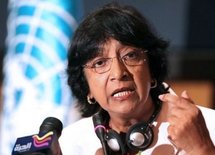UN rights chief chides Gulf states over women's employment
W.G. Dunlop
ABU DHABI, W.G. Dunlop- UN human rights chief Navi Pillay on Saturday criticised restrictions on women's employment in some Gulf countries and called for those barriers to be lifted.
"Women now have access to higher education in all six" Gulf Cooperation Council (GCC) countries, Pillay said at a news conference in Abu Dhabi.

UN human rights chief Navi Pillay holds a news conference in Abu Dhabi.
In Saudi Arabia, "we met a young lawyer with ten years' legal experience in the UK -- (she) cannot use it in her country," Pillay told AFP.
The lawyer "would like to come back, make a contribution, (but) doors are closed," Pillay said. "It doesn't... make economic sense not to open up employment for women, and to lift restrictions."
She also strongly condemned the system in some Gulf states under which women are required to have a male guardian, saying it "keeps women in a stranglehold of powerlessness."
"Nevertheless, I have been encouraged to see significant movement taking place on women's rights" in the Gulf, she said.
Pillay said she has urged Saudi Arabia, Qatar, Kuwait, and Bahrain, which she has visited as part of a tour of all six GCC countries, "to maintain, and if possible accelerate, the pace of reform" in the field of women's rights.
Pillay also said she has raised the issue of torture at meetings in the four GCC countries she has visited so far.
Some countries in the GCC face allegations of torture.
In a February report, Human Rights Watch accused Bahrain's security forces of torturing detainees.
And on Friday, Amnesty International called on the United Arab Emirates to investigate the alleged torture of 17 Indians who have been sentenced to death for murder.
The rights chief said she urges countries in the region to adopt the Optional Protocol to the Convention Against Torture.
"I think that would provide relief in situations where state actors are involved, whether it's a relative of somebody in authority or a law enforcement agent," Pillay said.
The protocol requires signatories to create "national preventive mechanisms" to monitor for abuses, and also provides for regular monitoring visits by UN experts, according to the UN's website.
She also said that "human rights education" could play a role.
"My office could help in this direction by holding training workshops and educational workshops to spread the message of human rights and humane treatment of persons who are arrested or detained," she said.
Pillay criticised the system under which migrant workers in most Gulf countries must be sponsored by a local employer.
"Many problems have arisen through the lack of protection safeguards in the so-called 'Kafala' or sponsorship system that leaves migrant workers vulnerable to an unequal power relationship with their employers," Pillay said.
"The treatment of migrant workers was a major point of discussion" in Saudi Arabia, Qatar, Kuwait and Bahrain, she said.
Pillay is to due to leave the UAE on Sunday for Oman, the final stop on her Gulf tour.
-------------------------------------------------------------------------------